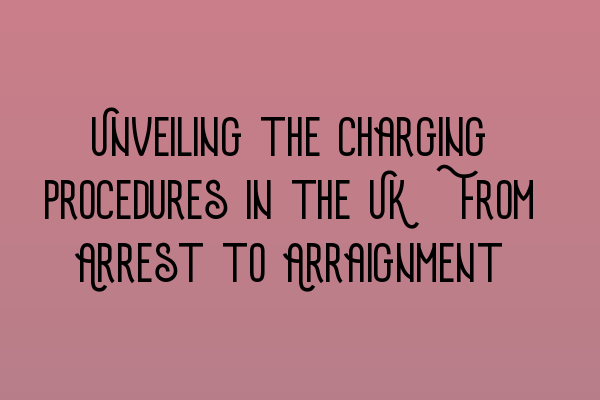Unveiling the Charging Procedures in the UK: From Arrest to Arraignment
Welcome to SQE Criminal Law & Practice Law UK, where we provide comprehensive information and support on criminal law procedures in the United Kingdom. In this blog post, we will delve deep into the charging procedures in the UK criminal justice system, taking you from the moment of arrest to the arraignment process.
The Arrest Process
When a person is suspected of committing a crime, they may be arrested by law enforcement officials. This is often done when there is strong evidence or reasonable grounds to believe that an offence has been committed. The arrest process involves the apprehension of the suspect, their rights being read to them, and being taken into custody.
If you want to know more about the arrest process and the rights of the arrested individuals, we recommend reading our article on SQE 1 Practice Exam Questions.
Investigation and Charging Decision
Following the arrest, the police will initiate an investigation into the alleged crime. This investigation includes gathering evidence, conducting interviews, and analyzing the facts surrounding the case. Based on the results of the investigation, the police will make a charging decision.
For a detailed understanding of the investigative process, we invite you to explore our article on SQE 1 Practice Mocks FLK1 FLK2.
Awaiting a Charging Decision
Once the police have made the charging decision, they must present the evidence to the Crown Prosecution Service (CPS). The CPS is responsible for determining whether there is sufficient evidence to charge the suspect with a criminal offence. This process can take some time, and the suspect may be released on bail or kept in custody while awaiting the charging decision.
The Arraignment Process
After the charging decision is made and the suspect is formally charged with an offence, the arraignment process begins. The suspect will be brought before a court, where they will enter a plea of guilty or not guilty. The arraignment is a crucial stage in the criminal justice process, as it sets the tone for the rest of the trial.
If you are interested in learning more about the arraignment process and its significance in criminal trials, we recommend reading our article on SQE 2 Preparation Courses.
Conclusion
Understanding the charging procedures in the UK is essential for anyone involved in or studying criminal law. From the arrest process to the arraignment stage, each step plays a vital role in ensuring a fair and just trial.
If you’re planning to pursue a career in criminal law, it is crucial to have a solid understanding of the criminal justice system and its processes. To help you prepare for your studies and examinations, we offer comprehensive SQE 1 Preparation Courses and SQE 2 Preparation Courses.
For more information on the SQE exam dates and requirements, visit SRA SQE Exam Dates.
We hope this article has shed light on the charging procedures in the UK criminal justice system. Stay tuned to our blog for more informative and engaging content on criminal law and practice in the UK.
